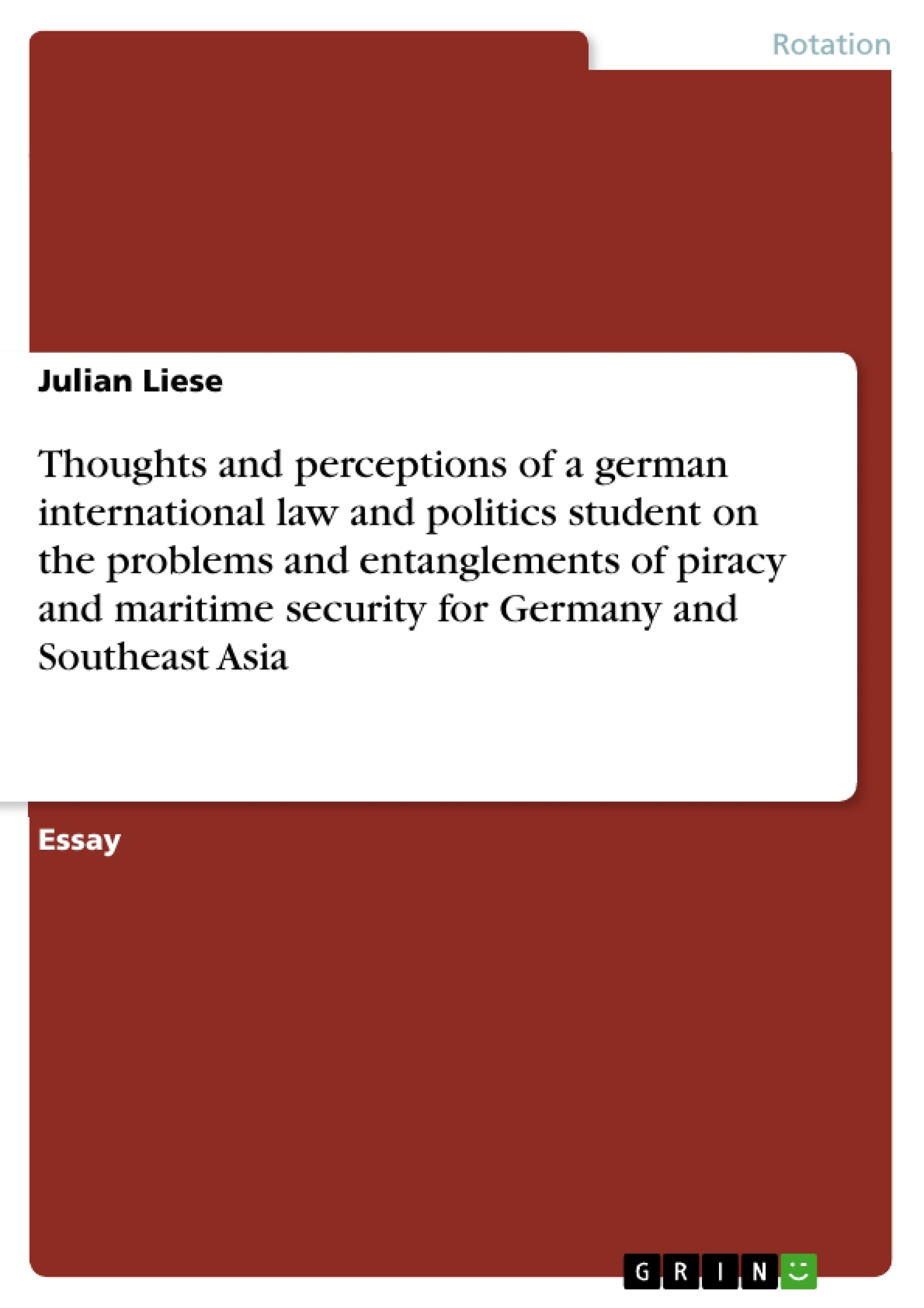Since Germany is one of the leading countries concerning the international trade via container shipping, one of the strongest export nations and, in the means of energy supply, is highly depending on the international sea trade; and Southeast Asia is a growing pole of the world’s market economy as well as an area of emerging maritime powers within the whole of Asia, has the world’s largest container harbour – Singapore – and contains the most popular and frequently used sea straits, it occurs, that there are growing entanglements and common interests.
What kind of chances lies in this circumstances and how can a stronger growing cooperation be facilitated?
Inhaltsverzeichnis (Table of Contents)
- Conditions, geography and other facts
- Germany's security interests; maritime security and piracy
- Conclusions and possible approaches
- Other considerations
Zielsetzung und Themenschwerpunkte (Objectives and Key Themes)
This paper aims to examine the relationship between Germany and Southeast Asia in the context of maritime security and piracy. It investigates the growing entanglements and common interests between these regions due to their reliance on seaborne trade and the presence of important shipping routes. The paper further explores potential opportunities for enhanced cooperation between Germany and Southeast Asian countries to address maritime security challenges.
- The strategic importance of Southeast Asia for global maritime trade and its implications for Germany
- The historical and contemporary challenges posed by piracy in the region
- The role of international cooperation in combating piracy and promoting maritime security
- The potential for Germany to engage in bilateral and multilateral initiatives with Southeast Asian countries to enhance maritime security
- The importance of addressing related issues such as trafficking and marine pollution
Zusammenfassung der Kapitel (Chapter Summaries)
- Conditions, geography and other facts: This chapter provides an overview of the geographical features and economic significance of the Southeast Asian maritime region, highlighting its vital role in global shipping routes. It emphasizes the importance of the Straits of Malacca and Singapore for international trade and the challenges posed by their narrow passages and dense traffic.
- Germany's security interests; maritime security and piracy: This chapter examines Germany's strong reliance on maritime trade and its security interests in Southeast Asia. It highlights the historical prevalence of piracy in the region and its resurgence in recent decades. The chapter discusses the collaborative efforts of Malaysia, Indonesia, and Singapore to combat piracy in the Straits of Malacca and Singapore, leading to a decline in criminal incidents.
- Conclusions and possible approaches: This chapter explores potential avenues for enhanced cooperation between Germany and Southeast Asia in addressing maritime security challenges. It proposes a role for Germany as a mediator in promoting international conventions and cooperation, facilitating institution building, and providing training and support to regional agencies.
Schlüsselwörter (Keywords)
Maritime security, piracy, Southeast Asia, Straits of Malacca, Singapore, Germany, international cooperation, trade, shipping, container shipping, regional cooperation, ReCAAP, UNCLOS, ISM, human rights, environmental protection, trafficking, marine pollution.
Frequently Asked Questions
Why is Southeast Asia strategically important for Germany?
Germany is a leading export nation highly dependent on international sea trade. Southeast Asia hosts the world's most frequently used sea straits, such as the Straits of Malacca, which are vital for German container shipping.
What are the main maritime security challenges in Southeast Asia?
The primary challenges include piracy, armed robbery at sea, maritime trafficking, and marine pollution in densely trafficked areas like Singapore and the Malacca Strait.
How do regional countries combat piracy?
Malaysia, Indonesia, and Singapore have established collaborative efforts and initiatives like ReCAAP to share information and conduct joint patrols, leading to a decline in incidents.
What role can Germany play in enhancing maritime security?
Germany can act as a mediator for international conventions, support institution building, and provide training and technical support to regional maritime agencies.
What is the significance of UNCLOS in this context?
The United Nations Convention on the Law of the Sea (UNCLOS) provides the legal framework for international maritime cooperation and the rights of states in international waters.
- Citar trabajo
- Julian Liese (Autor), 2009, Thoughts and perceptions of a german international law and politics student on the problems and entanglements of piracy and maritime security for Germany and Southeast Asia, Múnich, GRIN Verlag, https://www.grin.com/document/172664



